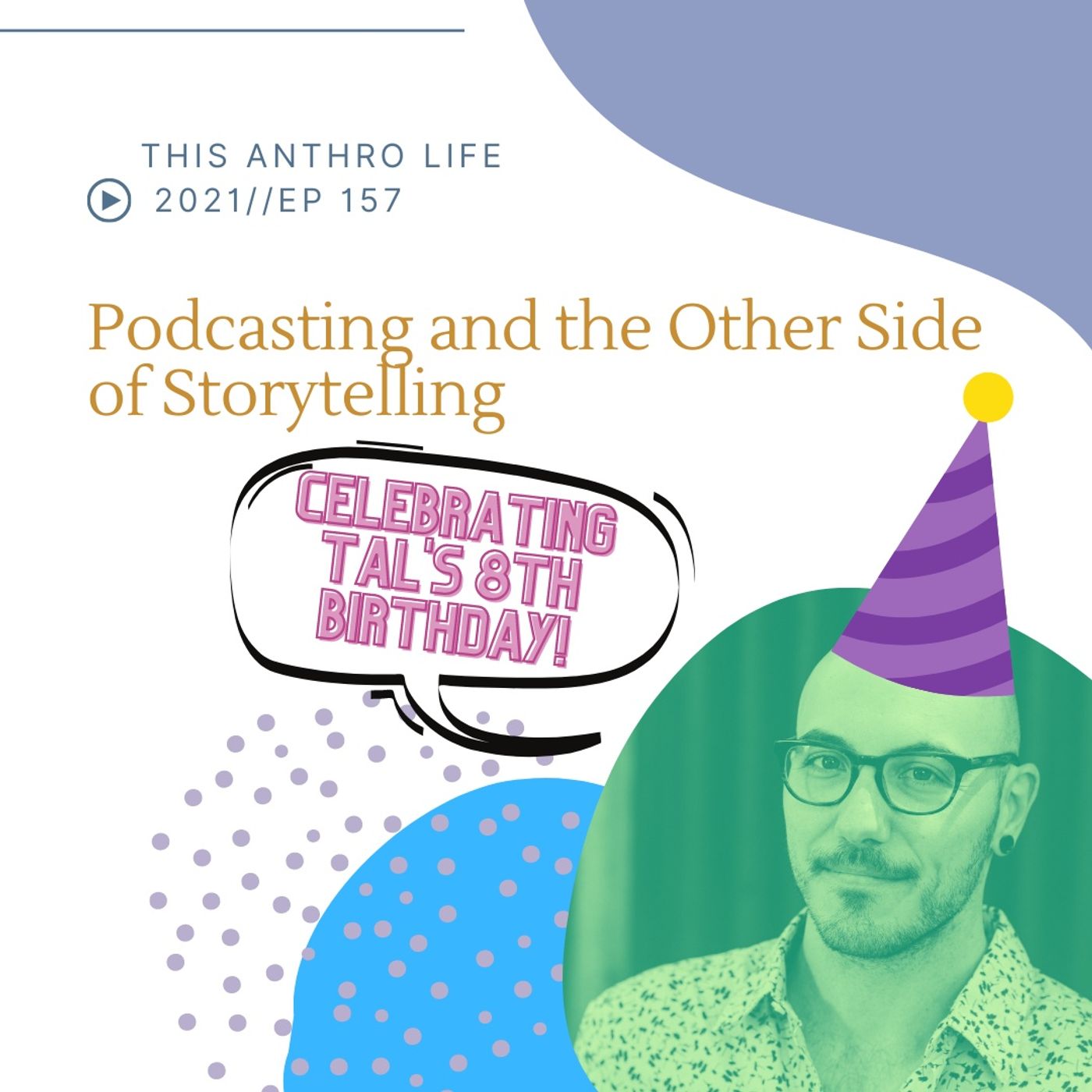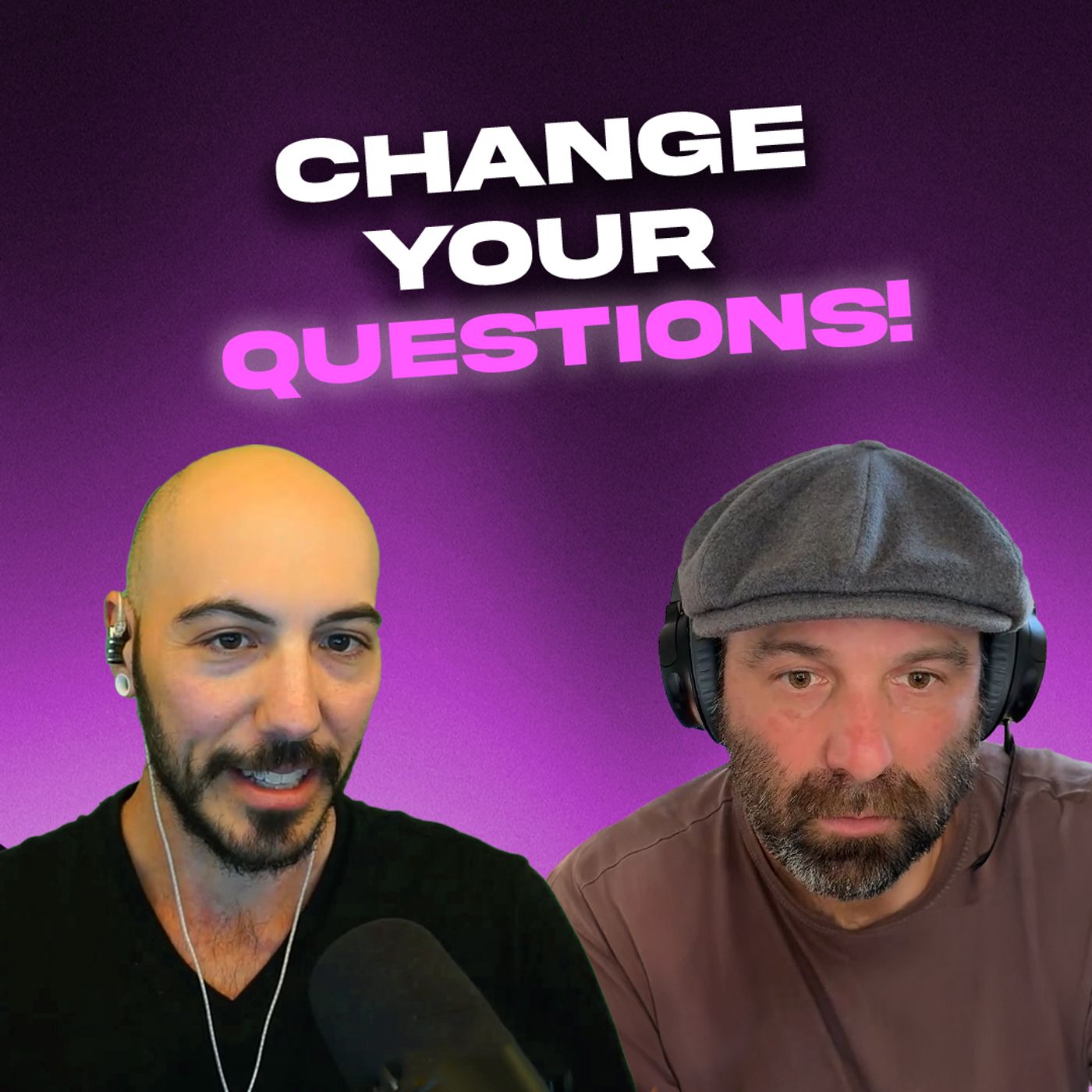Podcasting and the Other Side of Storytelling - Reflecting on TAL's 8th Birthday

This Anthro Life turned 8 years old in October 2021. That's a long time for a podcast. When recently invited to share what I've been working on for a newsletter, TAL's 8th birthday got me thinking about what I've learned working between anthropology and podcasting for almost a decade.
I've fancied myself a public anthropologist for a while, but it has been podcasting, and working in an unusual medium (for anthropology) that has taught me some of the most important lessons for what public anthropology actually is.
Music - Epidemic Sounds
Lenzer - A Fork Fight
Yomoti - Fansi Pan
This Anthro Life turned 8 years old in October 2021. That's a long time for a podcast. When recently invited to share what I've been working on for a newsletter, TAL's 8th birthday got me thinking about what I've learned working between anthropology and podcasting for almost a decade.
I've fancied myself a public anthropologist for a while, but it has been podcasting, and working in an unusual medium (for anthropology) that has taught me some of the most important lessons for what public anthropology actually is.
Music - Epidemic Sounds
Lenzer - A Fork Fight
Yomoti - Fansi Pan
[00:00:01] Adam Gamwell: Hello and welcome to This Anthro Life. I'm your host, Adam Gamwell. Recently I was contacted by my friends at the National Association for the Practice of Anthropology or NAPA to contribute to their quarterly newsletter, NAPA Notes.
Now in this publication practitioners share updates of what they're working on, such as their current research book, project, or policy, if that's part of their role. When looking over past additions to get a sense of content and style, I had this funny moment where I felt totally unsure of what I would write about.
Have you ever had that happen to you before?
I make podcast, sure, I work in industry, but I don't have a new book out and I don't have an ongoing research project that I can talk about. At least not in the traditional sense. Plus NDAs, that is nondisclosure agreements, means I can't exactly share what I work on for clients.
But I do have podcasting, which has always fit, at least in my opinion, a bit awkwardly between academic knowledge and research, practicing anthropology, business, and public media. It's kind of like a multi-pronged peg that doesn't quite fit into any one hole.
I have mostly conceived of my work with TAL as demonstrating the value of anthropology for life and for business and highlighting the work of others. I honestly didn't think too much about me as a character in the story. At least not for the first five years.
But if you've heard any of the interviews I've done since 2019, one thing I've learned to proudly pronounce is I do my best work in hybrid spaces that don't fit in any one category. It's where I feel like I'm able to learn the most and have the most impact. As I reflected on what I do have to share, I suddenly remembered that This Anthro Life just turned eight years old in October, 2021.
Eight years I've been doing this. And I thought about, you know, what have I learned? What has podcasting taught me about anthropology? And then some of the ideas that have been floating around in my head and in various pieces of content I've created, came together. So to celebrate This Anthro Life's eighth birthday, I'd love to share these reflections with you now.
This is what working in the hybrid spaces between anthropology, public media, and podcasting has taught me.
Storytelling's other half
[00:02:08] Adam Gamwell: This Anthro Life Podcast celebrates its eighth birthday this October. And over this time, the show has been downloaded over 400,000 times, nearly three quarters of that since 2019. Now This Anthro Life has been both a passion and a professional project for me, and always a form of practicing anthropology.
Two grad school colleagues and I began the show to see if we could take the dense insights of anthropological writing that we were ingesting every week and translate them into an engaging and accessible conversation. It was also because we believed that anthropology had something to say to the world, but it needed a little help to escape the page.
I later came to realize that my goal was also to build community by way of a shared sense of vulnerability that comes from always being in formation, feeling never quite caught up and unsure in a world of polished journal articles, ethnographies and distinguished scholars.
I fell in love with podcasting as did many people. There's just something unique and universal about the intimacy of sharing stories with one another, between microphones and earbuds.
And podcasting, like me, never quite felt at home in academia. And something was brewing in the alchemy of deep research, making weekly episodes, audio craft and the wider world's growing obsession with the media. The medium required a different kind of messaging, however, and I was intrigued. And my target audience began to change.
When first starting out, I was enthralled with the idea of public anthropology or an anthropology engaged in wider publics. But I found myself staring across the Gulf of that vague public and wondered what radio and podcast icons likeIra Glass and Terry Gross or journalists like Jon Ronson seemed to get right about pulling people in.
It turns out storytelling, though enthralling, is only half of it. The other part is they know their audiences. And it wasn't some vaguely defined public. Now, ironically, most of anthropology knows its audience very well, even if they don't realize it. Themselves.
What I found refreshing about podcasting is that any professional will tell you that your show isn't about you. It's about solving a problem for someone. And in order to solve their problem, you need to know who they are. What does that look like?
This Anthro Life is for Isabelle, a single mother in Australia who works in software and wants a boost in her day that makes her feel connected to an intellectual community - and reminds her that she is. It's also for Omar, a 27 year old finishing his master's who wants to go into industry, but doesn't know how to break in. He tunes in the episodes featuring business anthropologists and on career development. The show is also for Kiana. A sophomore who stumbled across the show in high school, after feeling inspired by a documentary on Australopithecus and wondered what else is out there? She's hooked on figuring out how to integrate anthropological perspectives into political discourse.
I'm grateful for Isabelle, Omar and Kiana because they've redefined for me what public anthropology can be. Being a public anthropologist was a story I told myself. Building community, career confidence and communication skills, now that's a public anthropology story we can tell together.
What's Next
[00:05:38] Adam Gamwell: I'm starting out TAL's ninth year with gratitude. So thank you for listening. Thank you for writing me and hopping on the zoom calls and sharing your perspectives. It really has meant the world to me. And more than once when I thought about hanging up the hat for a little while one of you reached out and told me how much the show means to you or what it has helped you accomplish. And honestly, that's what's kept me going.
Anthropology has taught me the power of reflexivity and in understanding one's place in the story. How being there changes the course of things. And podcasting has taught me to get real about audience. A famous maximum from the design world is that if you design for everyone, you design for no one. And honestly, I believe we can tell a better story about public anthropology together.
As I wrote this reflection, I realized I have a ton more to say and share, and I want to help you increase your impact too. You know, whether you're an academic researcher, a professor, a student looking to move from academia to industry, thinking about a career change or just a wandering creative soul, looking to get your voice out there. So starting in 2022, I'm going to be piloting some new courses, workshops, maybe even some one-on-one sessions focused on storytelling for social impact, defining your audience, and crafting our voices and message to create sustainable impact.
Here's the really cool part. If you're interested in being the first to try this out, shoot me a message at thisanthrolife-at-gmail dot com and let me know. Let me know what about this resonates with you, where you're at and what you're looking for. Your goals, needs, and voice will help shape what comes next. And just like This Anthro Life I can't do it without you.
Thanks again for coming along to this journey and I cannot wait to see what we build next. We'll see you soon. I'm your host is always Adam Gamwell and this is This Anthro Life.


















































